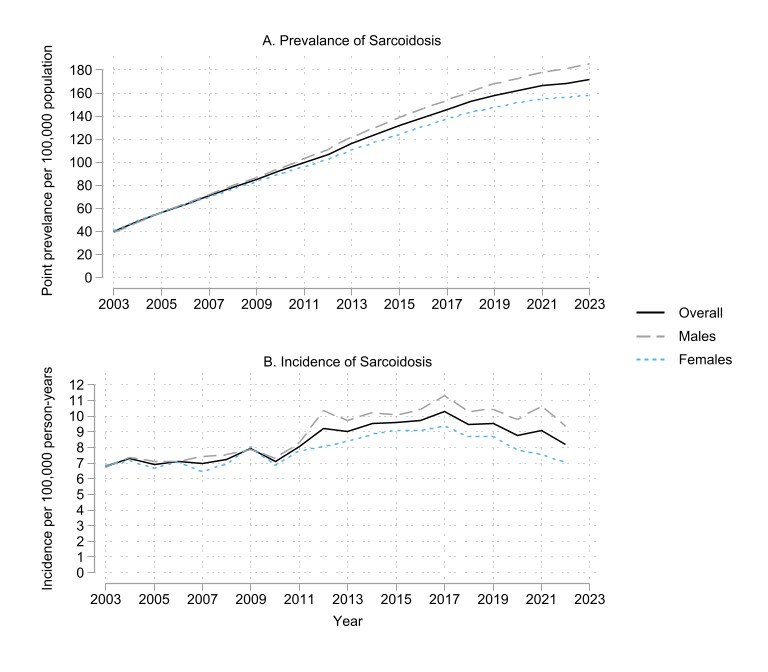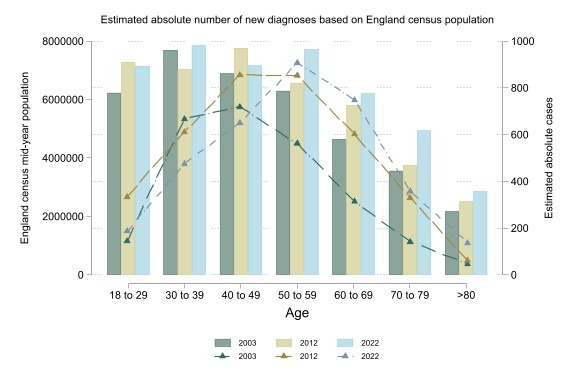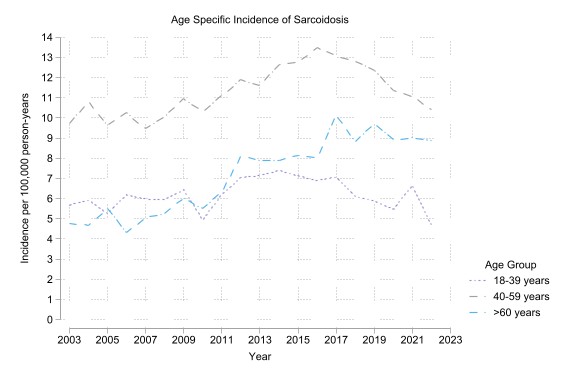Session Information
Session Type: Poster Session A
Session Time: 10:30AM-12:30PM
Background/Purpose: Sarcoidosis is heterogeneous condition, ranging from mild self-limiting disease to severe organ involvement and death. Despite its clinical significance, the epidemiological landscape in England is a blank canvas. The incidence was last calculated in 2004 and there are no published data on its prevalence. Our objective was to describe changes in the incidence and prevalence of sarcoidosis in England.
Methods: For this population study, we used primary care electronic health records from the Clinical Practice Research Datalink containing anonymised data for 41 million patients, with 13 million currently registered (20% of English population). Eligible patients had contributed data between 2003 and 2023, were ≥18 years and registered with their general practice for ≥12 months prior to their first diagnostic code. Incident cases were defined by a new code for sarcoidosis. Incidence was calculated by dividing the number of incident cases by the total person-years in the cohort. Point prevalence was calculated by dividing the number of people with a sarcoidosis code at mid-calendar year by the number of individuals contributing data at the same time point. Age, sex, and region-specific rates were computed. Standardised rates were calculated by applying direct age-and-sex standardisation to the 2013 European Standard Population. Crude rates were inferred by applying year-and age-specific incidence to UK census mid-year population estimates.
Results: The prevalence of sarcoidosis increased from 40 per 100,000 in 2003 to 168 per 100,000 in 2023 (figure 1a). Rates were similar when standardised by age and sex. Crude incidence increased by 21%, from 6.81 per 100,000 person-years in 2003 to 8.22 in 2022 [unadjusted incidence rate ratio (IRR) 1.21 (95%CI 1.09-1.33)] (figure 1b). The greatest increase occurred between 2010 and 2017, after which the rate began to fall. In models standardised for age and sex, a smaller increase in crude incidence was seen (6.82 to 7.98/100,000 person-years). The estimated absolute number of new diagnoses based on the UK census population increased from 2554 in 2003 to 3609 in 2022 (figure 2). The crude incidence of sarcoidosis was similar across sexes. However rising incident rates from 2010 were driven primarily by an increasing number of new diagnoses among males, resulting in a higher incidence compared to females by 2022 [males 9.36 v females 7.05/100,000 person-years [IRR 1.33 (95%CI 1.17-1.51)] (figure 1b). The incidence of sarcoidosis was highest amongst 40-60 years old throughout the study period, though there was a notable rise in new diagnoses in the over 60-cohort, reflected in an increasing age at presentation [2003: median 46 years (37-57) v 2022: 54 years (44-64)] (figure 3).
Conclusion: Over the last two decades the prevalence of sarcoidosis in England has increased four-fold. This reflects not only changes in incidence but also accounts for mortality. The incidence increased between 2010 and 2017 with notable changes in age and sex distribution. This rise may be attributed to the growing use of diagnostic imaging like PET-CT, and the widespread adoption of endobronchial ultrasound. These advancements have revealed that sarcoidosis is more common than previously recognised.
1b. The incidence of sarcoidosis per 100,000 person years between 2003 and 2022, defined overall and by sex.
To cite this abstract in AMA style:
Bechman K, Biddle K, Russell M, Gibson M, adas m, Yang Z, Alveyn E, Nagra d, Norton S, biring S, Galloway J. The Incidence and Prevalence of Sarcoidosis in England [abstract]. Arthritis Rheumatol. 2024; 76 (suppl 9). https://acrabstracts.org/abstract/the-incidence-and-prevalence-of-sarcoidosis-in-england/. Accessed .« Back to ACR Convergence 2024
ACR Meeting Abstracts - https://acrabstracts.org/abstract/the-incidence-and-prevalence-of-sarcoidosis-in-england/



